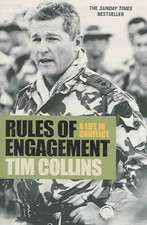Shadow Force: Private Security Contractors in Iraq: Praeger Security International
Autor David Isenbergen Limba Engleză Hardback – 29 dec 2008 – vârsta până la 17 ani
Din seria Praeger Security International
- 18%
 Preț: 334.19 lei
Preț: 334.19 lei - 8%
 Preț: 335.53 lei
Preț: 335.53 lei - 34%
 Preț: 376.10 lei
Preț: 376.10 lei - 46%
 Preț: 443.64 lei
Preț: 443.64 lei - 29%
 Preț: 240.11 lei
Preț: 240.11 lei - 8%
 Preț: 304.56 lei
Preț: 304.56 lei - 34%
 Preț: 373.82 lei
Preț: 373.82 lei - 19%
 Preț: 412.79 lei
Preț: 412.79 lei - 19%
 Preț: 338.42 lei
Preț: 338.42 lei - 18%
 Preț: 335.62 lei
Preț: 335.62 lei - 27%
 Preț: 377.35 lei
Preț: 377.35 lei - 27%
 Preț: 376.75 lei
Preț: 376.75 lei - 18%
 Preț: 336.46 lei
Preț: 336.46 lei - 18%
 Preț: 321.73 lei
Preț: 321.73 lei - 27%
 Preț: 384.51 lei
Preț: 384.51 lei - 18%
 Preț: 320.50 lei
Preț: 320.50 lei - 18%
 Preț: 320.50 lei
Preț: 320.50 lei - 18%
 Preț: 321.35 lei
Preț: 321.35 lei - 24%
 Preț: 420.54 lei
Preț: 420.54 lei - 14%
 Preț: 335.99 lei
Preț: 335.99 lei - 18%
 Preț: 355.82 lei
Preț: 355.82 lei - 18%
 Preț: 319.83 lei
Preț: 319.83 lei - 18%
 Preț: 334.28 lei
Preț: 334.28 lei - 32%
 Preț: 354.48 lei
Preț: 354.48 lei - 14%
 Preț: 335.14 lei
Preț: 335.14 lei - 38%
 Preț: 405.98 lei
Preț: 405.98 lei - 40%
 Preț: 571.34 lei
Preț: 571.34 lei - 18%
 Preț: 321.85 lei
Preț: 321.85 lei - 18%
 Preț: 323.25 lei
Preț: 323.25 lei - 18%
 Preț: 253.28 lei
Preț: 253.28 lei - 40%
 Preț: 571.50 lei
Preț: 571.50 lei - 14%
 Preț: 333.72 lei
Preț: 333.72 lei - 18%
 Preț: 301.73 lei
Preț: 301.73 lei - 19%
 Preț: 352.96 lei
Preț: 352.96 lei - 26%
 Preț: 387.80 lei
Preț: 387.80 lei - 18%
 Preț: 302.77 lei
Preț: 302.77 lei - 14%
 Preț: 333.91 lei
Preț: 333.91 lei - 17%
 Preț: 325.80 lei
Preț: 325.80 lei - 24%
 Preț: 338.58 lei
Preț: 338.58 lei - 34%
 Preț: 414.73 lei
Preț: 414.73 lei - 18%
 Preț: 354.30 lei
Preț: 354.30 lei - 29%
 Preț: 254.29 lei
Preț: 254.29 lei - 18%
 Preț: 354.11 lei
Preț: 354.11 lei - 18%
 Preț: 334.38 lei
Preț: 334.38 lei - 14%
 Preț: 302.68 lei
Preț: 302.68 lei - 18%
 Preț: 322.97 lei
Preț: 322.97 lei - 27%
 Preț: 376.50 lei
Preț: 376.50 lei - 27%
 Preț: 322.81 lei
Preț: 322.81 lei - 27%
 Preț: 382.91 lei
Preț: 382.91 lei - 18%
 Preț: 320.87 lei
Preț: 320.87 lei
Preț: 322.49 lei
Preț vechi: 392.51 lei
-18% Nou
Puncte Express: 484
Preț estimativ în valută:
61.72€ • 64.19$ • 50.95£
61.72€ • 64.19$ • 50.95£
Carte tipărită la comandă
Livrare economică 14-28 aprilie
Preluare comenzi: 021 569.72.76
Specificații
ISBN-13: 9780275996338
ISBN-10: 0275996336
Pagini: 264
Dimensiuni: 156 x 235 x 25 mm
Greutate: 0.54 kg
Editura: Bloomsbury Publishing
Colecția Praeger
Seria Praeger Security International
Locul publicării:New York, United States
ISBN-10: 0275996336
Pagini: 264
Dimensiuni: 156 x 235 x 25 mm
Greutate: 0.54 kg
Editura: Bloomsbury Publishing
Colecția Praeger
Seria Praeger Security International
Locul publicării:New York, United States
Notă biografică
David Isenberg is an independent analyst in national and international security affairs. He writes a weekly column on private security contractors for United Press International. He previously worked at the British American Security Information Council, DynCorp, and the Center for Defense Information. He lives in Arlington, VA.
Cuprins
AcknowledgmentsPrefaceChapter 1: Overview of the military issueChapter 2: PMCs in IraqChapter 3: The playersChapter 4: Control and Accountability at Abu GhraibChapter 5: Control and Accountability IssuesChapter 6: Conclusions
Recenzii
As a careful, sober survey of PMCs, Shadow Force is a valuable contribution to the public debate about contracting.Isenberg's arguments are solid.His book should be on every activists' and researchers' shelf.
Without significantly scaling back US geopolitical commitments or vastly expanding the US military, private military contractors will remain a part of the forces deployed in US military commitments, argues the author, who on that basis surveys the major issues and lessons concerning the operations of private military contractors in the US occupation of Iraq, focusing on private security contractors, such as Blackwater, more than contractors that serve logistical functions, such as KBR. He surveys the major players in the industry and then discusses issue of control and accountability, particularly in reference to the Abu Ghraib torture scandal, conflicts between contractors and military commanders, and theproblems of regulation and control in US domestic politics.
. . . thoughtful and thorough analysis of the rise of PMCs as actors in modern conflicts. . . . Although much has been written about this topic, the balanced discussion provided by Isenberg is an essential read for those seeking to learn more about the role and implications of PMCs.
Isenberg provides a detailed overview of the local situation with striking precision and figures. First, he outlines the origin and path of what he calls the 're-emergence of an old phenomenon,' explaining the long-term U.S. policy of military outsourcing and its often controversial nature. The author then examines the consequences of such a strategy during Operation Iraqi Freedom.
Without significantly scaling back US geopolitical commitments or vastly expanding the US military, private military contractors will remain a part of the forces deployed in US military commitments, argues the author, who on that basis surveys the major issues and lessons concerning the operations of private military contractors in the US occupation of Iraq, focusing on private security contractors, such as Blackwater, more than contractors that serve logistical functions, such as KBR. He surveys the major players in the industry and then discusses issue of control and accountability, particularly in reference to the Abu Ghraib torture scandal, conflicts between contractors and military commanders, and theproblems of regulation and control in US domestic politics.
. . . thoughtful and thorough analysis of the rise of PMCs as actors in modern conflicts. . . . Although much has been written about this topic, the balanced discussion provided by Isenberg is an essential read for those seeking to learn more about the role and implications of PMCs.
Isenberg provides a detailed overview of the local situation with striking precision and figures. First, he outlines the origin and path of what he calls the 're-emergence of an old phenomenon,' explaining the long-term U.S. policy of military outsourcing and its often controversial nature. The author then examines the consequences of such a strategy during Operation Iraqi Freedom.














